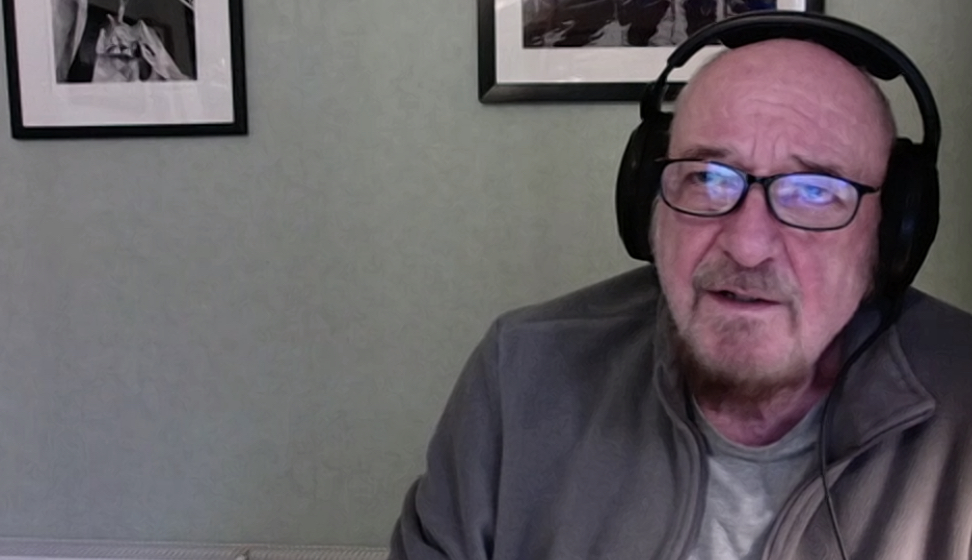
Ian Anderson via a Zoom interview, May 8, 2023
He’s one of rock’s most distinctive voices, composers and flutists. And in 2024, Ian Anderson, synonymous with Jethro Tull since their debut album arrived in 1968, is seemingly as busy as ever, having released the band’s second studio album, RökFlöte, in as many years, and supervising the preparation of archival box sets, while also filling their touring calendar into 2025. He reached the milestone age of 75 on August 10, 2022, and told Best Classic Bands, “I certainly don’t think more than a year ahead. That becomes increasingly more foolhardy as you get older.”
In 2023, we talked to the musician via Zoom about the demand that the band faced in its first decade with the constant cycle of writing, recording and touring, and his own mortality.
RökFlöte is based on the characters and roles of some of the principal gods of the old Norse paganism, while at the same time exploring the “RökFlöte”—rock flute—which Anderson has made iconic. Of the album’s theme, he says, “The world of scary Norse invaders seems to have captured people’s attention. But I don’t think it really tells the story of who those people were, what they did. Which was a curious mixture of bringing a rather wayward culture to countries at that point that were already, essentially, Christian. But they did dreadful things. They were the equivalent of Putin going into Ukraine. They were really quite awful people.
“There’s no doubt that if the Viking invaders had their hands on hypersonic missiles or some tactical nuclear weapons, they would have used them. Luckily, they didn’t. But they were a bad lot.”
RökFlöte begins and ends with the spoken intro by a woman, who sounds like she’s speaking in the fictional language, Valyrian (like Emilia Clarke’s character, Daenerys Targaryen, in Game of Thrones). Anderson is asked if he watched the series.
“No, I avoided the swashbuckling, dark ethereal worlds, everything from Harry Potter through to the more dark and scary stuff that I’ve never really enjoyed. It seems so heavy-handed as a treatment to glamorize the kind of drama that sits somewhere between science fiction and ancient history. It’s a well-worn trick and having been an avid consumer of science fiction written in the ’50s and ’60s, I decided in the ‘60s what kind of science fiction I liked and didn’t like… anything that smacks of the grandiose worlds that get exploited in blockbuster movies or Netflix series. Compared to the opening of the first three or four minutes of the first episode of Breaking Bad, that had you by the balls straight-away, and you knew that was going to be something special. It’s the same with music. You either get attracted to something or you don’t. And maybe some people, whenever they hear [mimics Beethoven’s 5th Symphony ‘dah dah dah dum…’], just think, ‘Oh, switch it’ because they’re not attracted to something that is such a declamatory and forceful, simple statement. Musically, it’s a bit too in their face and they’re not ready for it. We’re all different, thank goodness.”
RökFlöte followed the 2022 release of The Zealot Gene, following a gap of nearly two decades between Jethro Tull studio albums. And Tull has been playing a pair of songs from each of the new titles during their live performances. “The [new] songs are an unwelcome intrusion to the expectations that [the audience] might have of hearing classic Jethro Tull from the ‘70s,” Anderson admits. “I’m always aware of that. Since 1969, debuting songs from a new album has been tortuous because you know people are not familiar with it. They know you from your previous work. You hope several years down the line people will say, ‘Oh, I know this one. It sounds like an old friend.’ The response to the songs from the last two albums has been generous and positive and that’s the most we can hope for. But I don’t think it has the impact, perhaps, of songs like ‘Aqualung’ or ‘Locomotive Breath’ will have on an audience. I could throw in ‘A Whiter Shade of Pale’ and ‘Whole Lotta Love’ and maybe a couple of Stones songs and they’d be very happy. Except me. (laughs)”
He’s asked if he can close his eyes and imagine himself five, six decades earlier on stage.
“Well, absolutely. The passage of so many years has always been relatively immaterial. When you work with music, it’s not that it rekindles your youth, so much as it is just a reference point that you can immerse yourself in. When you play music, it is a bit timeless. When I play a song that I wrote in 1968 or 1969, it really just feels like I’m just stepping into that pair of shoes that are really well worn. It doesn’t feel like it’s 55 years [later]. I think I’d feel the same if I were a classical musician playing the work of Mozart or Bach or Beethoven. I wouldn’t consciously be thinking, ‘Oh, this is music from the mid-19th century.’ I’d just be dealing with the music as [a] living, permanent [part of] the world of today.”
Related: Our Album Rewind of Tull’s 1972 classic, Thick As a Brick
Jethro Tull released a new studio album every year from 1968 through 1980. One wonders what that constant cycle of writing, recording, touring, writing, recording, etc., was like.
“It was a very arduous period of constant tours and sometimes things were of relatively short notice,” says Anderson. “Back then, a tour would be booked only three months down the line. And if you were trying to put together time for rehearsals and recording a new album, and you were trying to sandwich this into a schedule that constantly felt like it was changing… I think that sometimes the music suffered in not being able to step back a little bit and take some time. But I feel that the positive side of that scheduling was to really push you to try to achieve things against what seemed to be a lot of odds.”
“But there was no time to take a break. And for 10 years, it certainly affected all of us in the band. We were getting pretty fatigued about touring and the little things that are disagreeable became more and more disagreeable, and we, in many ways, continued to grow apart, because none of us were really like each other. We were all quite different characters in the early days of Jethro Tull. And we really didn’t have a lot in common as people. So we tended not to socialize during the brief days that we might be back home [from the road] or when we weren’t in the studio. We didn’t hang out together really at all. And I think the times we were together were preserved for more creative and mutual benefit in terms of being truly a band…a group of people who worked and largely lived together. But it was getting torturous by the end of the ‘70s and at least three of the band, at that point, decided that they didn’t want to continue. Sadly, one of them was unable to continue because he met an early period of ill health, which resulted in his death so that was, in its own way, a bit of watershed moment, really. But two other guys had had enough and the band was clearly not going to go on the way that it had.”
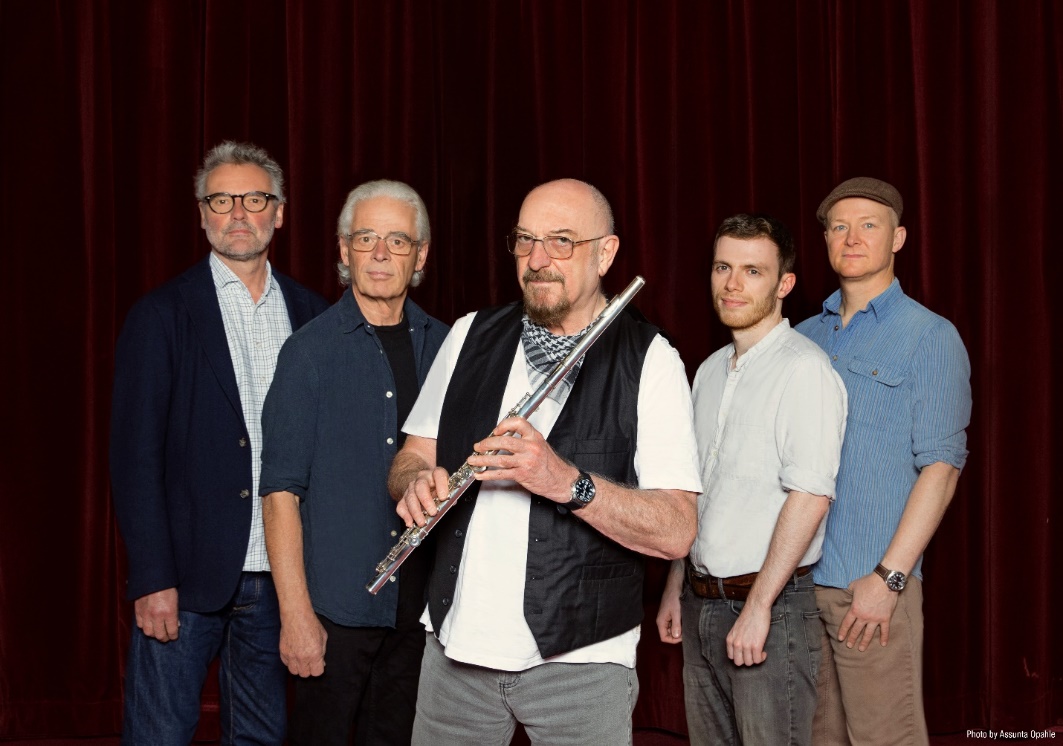
Ian Anderson, holding his rock flute, with Jethro Tull’s 2023 lineup
These days, Anderson employs a modestly sized touring party, with the band and four key crew members. The lineup consists of Tull veterans David Goodier (bass guitar) and John O’Hara (piano, keyboards and Hammond organ), plus Scott Hammond (drums), and Joe Parrish-James (electric and acoustic guitars, mandolin). They’ll be in the U.K. and Europe through mid-October, with three separate U.S. tours in between and after.
“I take it a few months at a time… up to a year,” Anderson says. “The visa officials say, ‘When will you be back?’ I give the same answer, ‘I have no plans to come back.’ Just as I said many years ago, ‘I have no plans to release another Jethro Tull album.’ (laughs) Because I didn’t. But it doesn’t mean I’m not going to do it. It just means that I have no plans inked in in the date sheet. I think people misconstrue when you say you have no plans that you intend not to do it but that’s not really the case.
“Let’s be honest. At my age, I have every hope that I will be alive and kicking and be able to do some semblance of a working day 10 years from now. But that is, to a degree, slightly wild optimism. The reality is that any time I might get some bad news at one of my annual health checks. It’s gonna happen some day. Will happen. I prefer to take it a year at a time, see how things go. I have to do some degree of planning. I certainly don’t think more than a year ahead. That becomes increasingly more foolhardy as you get older.”
See Jethro Tull on tour. Tickets are available here and here. Their extensive catalog, including many archival box sets, is available in the U.S. here and in the U.K. here.

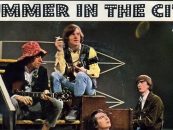

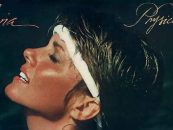
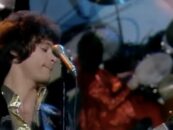

6 Comments so far
Jump into a conversationLes Paul lived 94 glorious years. May Ian and his contemporaries live so long.
It’s tragic to see Anderson, who was once one of THE most talented and amazing singers of any band now reduced to a guy who can barely get the lyrics out, never mind with any real energy or emotion. My big bugaboo about “Jethro Tull” as it stands now was Anderson’s unceremonious dismissal of Martin Barre after so many decades of loyalty and incredible musical contributions. But now, to see what Anderson has come to, I don’t think it really matters any more.
yes Martin was around over a long period. Seems to happen a lot in groups
Just want to point out that in the YouTube clip of Jethro Tull in The Rolling Stones Rock ‘n’ Roll Circus, Tony Iommi (of Black Sabbath fame) is the guitarist who appears onstage, but the group (except for Anderson) are miming to the original This Was studio recording, so it’s actually Mick Abrahams you’re hearing on guitar and not Tony.
Speaking of Abrahams he went on to form one of the great under the radar bands Blodwyn Pig…the album Ahead rings out is absolutely fantastic…. Like the band Manassas they lasted too briefly.
The R+R Hall should be ashamed.